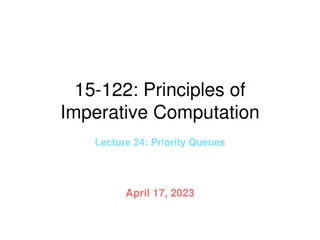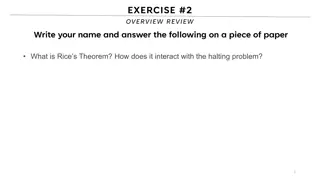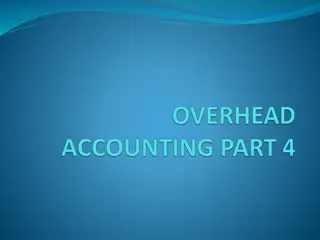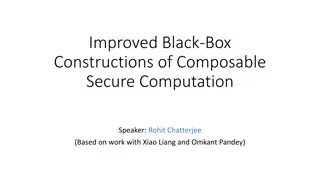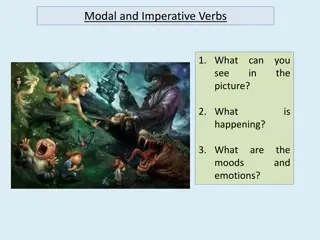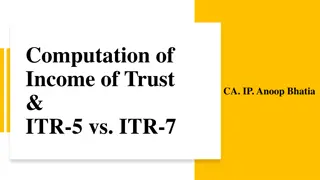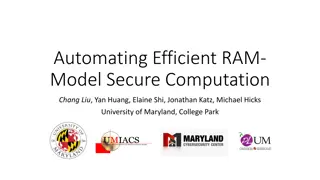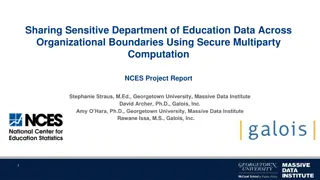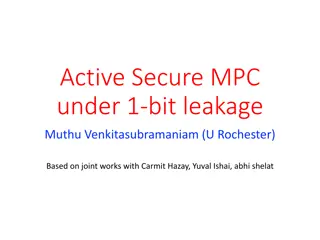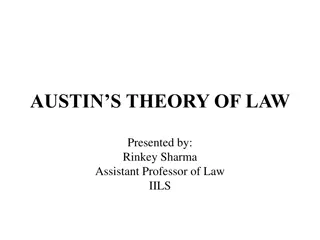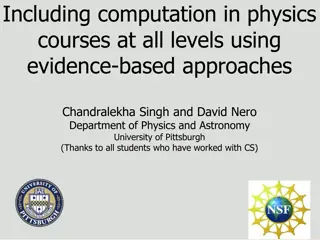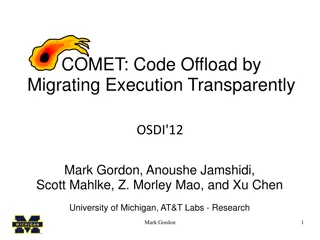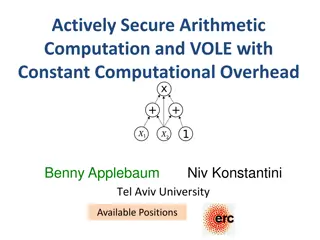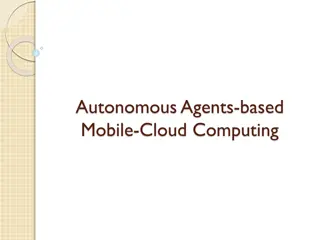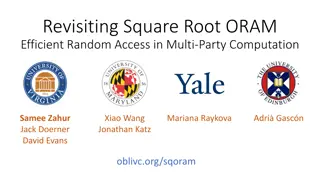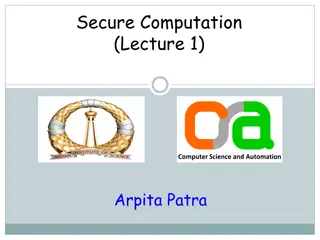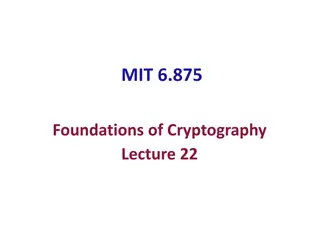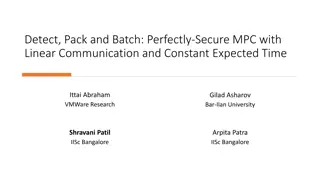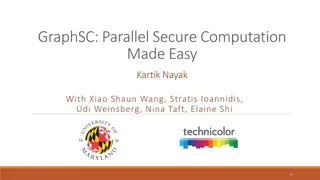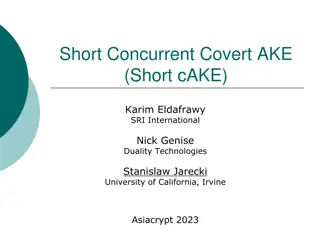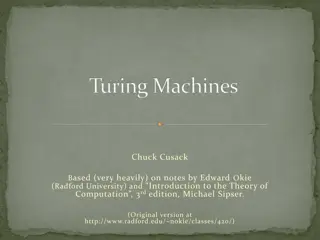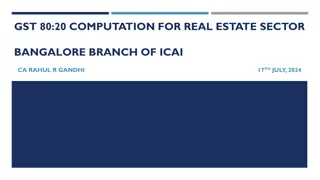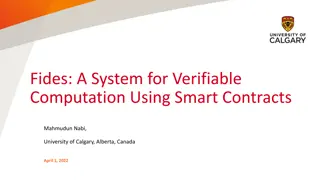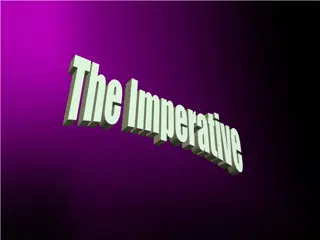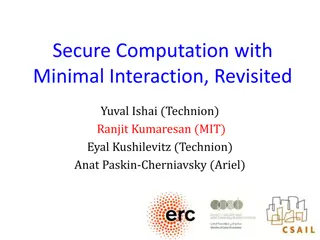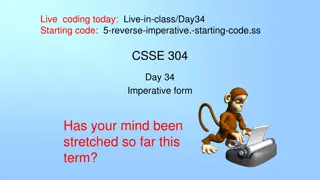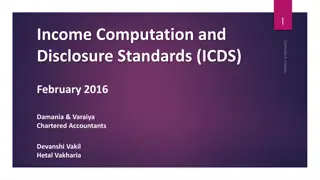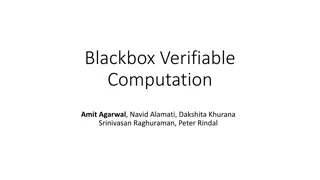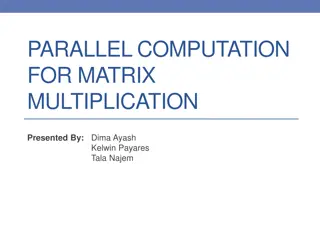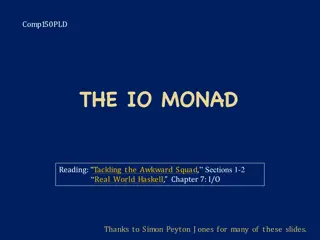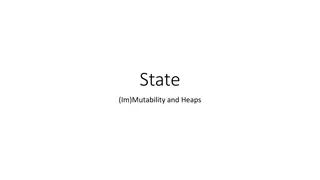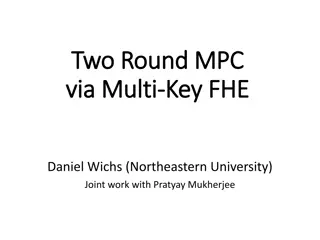Addressing Syphilis Resurgence: A Public Health Imperative
Syphilis has reemerged as a critical global public health concern, with alarming rates of new cases reported worldwide. The webinar by Dr. Christian McGrath sheds light on the resurgence of syphilis, its impact on various regions including Australia and Victoria, and outlines key strategies for publ
0 views • 20 slides
15-122: Principles of Imperative Computation.
Explore the fundamentals of priority queues, including how they prioritize elements based on specific criteria, such as emergencies or deadlines. Learn about key operations like adding and retrieving elements, with examples from different real-world scenarios. Delve into creating a Priority Queue In
1 views • 45 slides
Computability: Exploring Theoretical Limits of Computation
Delve into computability theory, focusing on what is computable and the limits of computation. Explore concepts like Rice's Theorem, the Halting Problem, and classes of expressiveness in computability theory, such as combinational logic, finite-state machines, pushdown automata, and Turing machines.
5 views • 43 slides
Overview of Distributed Systems: Characteristics, Classification, Computation, Communication, and Fault Models
Characterizing Distributed Systems: Multiple autonomous computers with CPUs, memory, storage, and I/O paths, interconnected geographically, shared state, global invariants. Classifying Distributed Systems: Based on synchrony, communication medium, fault models like crash and Byzantine failures. Comp
10 views • 126 slides
Computation of Machine Hour Rate: Understanding MHR and Overhead Rates
Computation of Machine Hour Rate (MHR) involves determining the overhead cost of running a machine for one hour. The process includes dividing overheads into fixed and variable categories, calculating fixed overhead hourly rates, computing variable overhead rates, and summing up both for the final M
5 views • 18 slides
Enhanced Security in Multiparty Computation
Explore the improved black-box constructions of composable secure computation, focusing on definitions, objectives, and the formalization basics of multiparty computation (MPC). Learn about the motivating security aspects in MPC and the real/ideal paradigm. Discover how MPC security involves compari
1 views • 68 slides
English Imperative Sentences
English imperative sentences function as directives or commands, characterized by having no overt subject noun phrase, using an implicit second-person pronoun (you) as the subject, being tenseless with the base form of the verb, always indicating future actions, and not occurring in subordinate clau
1 views • 22 slides
Modal and Imperative Verbs: Usage and Examples
This content covers the explanation and examples of modal verbs, which express certainty, possibility, and obligation, as well as imperative verbs that denote commands and orders. Learn to identify and use these verb types accurately and creatively through practical examples and engaging activities.
2 views • 12 slides
Trust Income Computation and Application Guidelines
Learn about income computation of trusts using ITR-5 vs. ITR-7, types of institutions, components of income, application of income, and important guidelines including amendments by FA2022 for charitable and religious trusts.
0 views • 47 slides
Secure Computation Techniques in RAM Models with Efficient Automation
Explore the automation of efficient RAM-model secure computation techniques, including examples such as secure binary search. Discover how traditional solutions using circuit abstractions can be improved for sub-linear time computation through methods like Oblivious RAM. Learn about techniques such
0 views • 37 slides
Secure Multiparty Computation for Department of Education Data Sharing
This report discusses the use of Secure Multiparty Computation (SMC) to enable sharing of sensitive Department of Education data across organizational boundaries. The application of SMC allows for joint computation while keeping individual data encrypted, ensuring privacy and security within the Nat
0 views • 15 slides
Advancements in Active Secure Multiparty Computation (MPC)
Delve into the realm of secure multiparty computation under 1-bit leakage, exploring the intersection of DP algorithms, MPC, and the utilization of leakage for enhanced performance. Discover the overhead implications of achieving active security, as well as the evolution of secure computation protoc
0 views • 43 slides
Austin's Theory of Law in Jurisprudence
Austin's Imperative Theory of Law, presented by Assistant Professor Rinkey Sharma, delves into the foundational concepts of English jurisprudence as formulated by Austin. His work categorizes jurisprudence into general and particular aspects, exploring principles common to various legal systems and
0 views • 11 slides
Enhancing Computation in Physics Education Using Cognitive Approaches
Utilizing evidence-based methods, this study explores incorporating computation in physics courses, focusing on instructional design, student knowledge states, and preparation for future learning. It discusses common conceptual difficulties in quantum mechanics and proposes cognitive theory-based st
0 views • 24 slides
Secure Multiparty Computation: Enhancing Privacy in Data Sharing
Secure multiparty computation (SMC) enables parties with private inputs to compute joint functions without revealing individual data, ensuring privacy and correctness. This involves computations on encrypted data using techniques like homomorphic encryption for scenarios like e-voting. SMC serves as
2 views • 27 slides
COMET: Code Offload by Migrating Execution - OSDI'12 Summary
The research paper discusses COMET, a system for transparently offloading computation from mobile devices to network resources to improve performance. It outlines the goals of COMET, its design, and evaluation, focusing on distributed shared memory and bridging computation disparity through offloadi
0 views • 31 slides
Actively Secure Arithmetic Computation and VOLE Study
Exploring actively secure arithmetic computation and VOLE with constant computational overhead at Tel Aviv University. Understanding how functions are represented in secure computation using arithmetic circuits over boolean circuits. Efficiently evaluating arithmetic circuits over large finite field
0 views • 36 slides
Enhancing Mobile-Cloud Computing with Autonomous Agents Framework
Autonomous Agents-based Mobile-Cloud Computing (MCC) refers to moving computing tasks to powerful centralized platforms in the cloud, offering advantages like extending battery life and dynamic resource provisioning. However, an inflexible split of computation between mobile and cloud platforms lead
0 views • 22 slides
Enhancing Multi-Party Computation Efficiency Through ORAM Techniques
Explore the realm of efficient random access in multi-party computation through the reevaluation of classic schemes and the introduction of new approaches. Discover the potential of ORAM in improving performance and reducing costs in various computational tasks, such as secure multi-party computatio
0 views • 22 slides
Rules for Changing Imperative Sentences in Reported Speech
Learn the rules for changing imperative sentences in reported speech with examples. Discover how to transform direct commands into indirect requests, advice, or orders. Understand the structure of reported speech when addressing a person. Explore how to add respect when "Sir" is present in the repor
0 views • 14 slides
Secure Computation in the Age of Information
Welcome to Secure Computation Lecture 1 by Arpita Patra. The course covers evaluation policies, projects, and references in the realm of secure computation. The content delves into the significance of information security across various sectors, emphasizing the importance of safeguarding sensitive d
0 views • 36 slides
Secure Two-Party Computation and Basic Secret-Sharing Concepts
In today's lecture of "Foundations of Cryptography," the focus is on secure two-party and multi-party computation, emphasizing semi-honest security where Alice and Bob must compute without revealing more than necessary. Concepts such as real-world vs. ideal-world scenarios, the existence of PPT simu
0 views • 27 slides
Linear Communication in Secure Multiparty Computation for Efficient and Fast Processing
The research focuses on achieving perfectly secure multiparty computation (MPC) with linear communication and constant expected time. It explores efficient approaches using a broadcast-hybrid model and P2P communication, aiming to balance speed and efficiency in MPC. The study highlights the importa
0 views • 23 slides
Secure Computation Challenges and Solutions in Data Mining
Exploring the intersection of secure computation and data mining, this content uncovers key challenges such as improving algorithms, converting programs for secure computation, and addressing parallelizability issues. It highlights the importance of cryptography in ensuring data privacy and presents
0 views • 30 slides
Covert Computation: Ensuring Undetectable Engagement
Covert computation aims to conceal the fact that computation is occurring and hide engagement in certain tasks like secure computation, authenticated key exchange, and more. By making messages indistinguishable and utilizing steganographic channels, it becomes possible to keep the activities covert
0 views • 16 slides
Overview of Turing Machines: Introduction, Tape, and Computation
Turing Machines are fundamental in the theory of computation, capable of recognizing all computable languages. They consist of a Finite State Machine combined with an infinite tape. The tape is initialized with input on the left end, and a TM's computation can either halt by entering special accept
0 views • 29 slides
Computation for Real Estate Sector in Bangalore Branch of ICAI
Practical overview of GST computation for real estate transactions in Bangalore, with details on old rates with ITC and new rate regime effective from April 1, 2019. The content discusses different transactions, conditions for new rates without ITC, and provides insights on the 80:20 computation met
0 views • 39 slides
Fides: A System for Verifiable Computation Using Smart Contracts
Fides presents a system for verifiable computation using smart contracts, focusing on blockchain basics, Ethereum, smart contracts, and outsourcing computation. It explores key components of blockchain, Ethereum's decentralized computing platform, properties of smart contracts, and the concept of ve
1 views • 25 slides
The Imperative Mood in Language
The imperative mood focuses on giving commands without reference to different time frames. It entails direct statements with the understood recipient mainly being 'you.' Commands in the singular, informal form involve dropping the 's' from the second person singular verb, both in affirmative and neg
0 views • 19 slides
Computer Programming Principles
Dive into the world of computer programming, covering high-level and machine languages, compilers, interpreters, writing programs, top-down design, and the array of programming languages available. Understand the essentials of building code to control computers, the diversity of programming language
0 views • 23 slides
The Jan-San Omnichannel Imperative Executive Conference Highlights
Explore the key discussions of The Jan-San Omnichannel Imperative Executive Conference, focusing on paradigm shifts in digital value creation, Amazon business strategies, and channel model innovations. Delve into back-casting for forward innovation, omnichannel imperatives for B2B end-users, and env
0 views • 28 slides
Insights into Secure Computation with Minimal Interaction
This paper revisits the concept of secure computation with minimal interaction, focusing on the challenges and possibilities of achieving secure multiparty computation in 2 rounds. Specifically exploring scenarios with 3 and 4 parties, the study delves into the reasons for choosing n=3, n=4, and t=1
0 views • 23 slides
Imperative Form in Scheme Programming
Delve into the world of imperative programming in Scheme, exploring the boundaries of C or Assembly Language resemblance. Discover how Scheme can serve as a robust language for interpreter implementation and contemplate if a simpler language without first-class procedures would suffice for Assignmen
0 views • 18 slides
Overview of Income Computation and Disclosure Standards (ICDS)
The Income-tax Act, 1961 introduced Income Computation and Disclosure Standards (ICDS) to be followed by certain assesses for computation of income. ICDS applies to taxpayers using the mercantile system of accounting from the Assessment Year 2016-17 onwards. Non-compliance with ICDS can lead to Best
0 views • 49 slides
Mastering Narration: Changing Reported Speech Types
In this English lesson for Class Nine students, the topic of Narration Part 3 focuses on changing the reported speech when it is imperative, optative, or exclamatory. Learning outcomes include the ability to transform such speeches effectively. The lesson covers rules for imperative reported speech,
0 views • 22 slides
Blackbox Verifiable Computation Scheme Overview
This summarized content discusses the concept of blackbox verifiable computation, focusing on the challenges faced by clients and servers, the role of helper oracles, positive results utilizing homomorphic encryption, and background information on Random Self Reducible (RSR) functions. The protocol
0 views • 20 slides
Parallel Computation for Matrix Multiplication
Matrix multiplication is a fundamental operation with diverse applications across scientific research. Parallel computation for matrix multiplication involves distributing the computational workload over multiple processors, improving efficiency. Different algorithms have been developed for multiply
0 views • 36 slides
Tackling the Awkward Squad in Functional Programming
Functional programming is known for its beauty in concise abstractions and high-order functions, but it often struggles with managing the "Awkward Squad" of input/output, imperative state, and error handling. The Direct Approach involves dealing with side effects and imperatives directly but can lea
0 views • 43 slides
State, Mutability, and Heaps in Programming
Explore the concepts of (im)mutability, imperative vs. functional programming, referential transparency, and challenges for strict immutability in programming. Learn about the differences between imperative and functional languages, the benefits of referential transparency, and the challenges of mai
1 views • 46 slides
Advanced Techniques in Multi-Party Computation
Explore cutting-edge methods in Multi-Party Computation (MPC), including leveraging Fully Homomorphic Encryption (FHE) for minimal round complexity, constructing MPC directly via FHE techniques, and simplifying multi-key FHE constructions for efficient decryption. Learn about key concepts such as di
0 views • 17 slides

